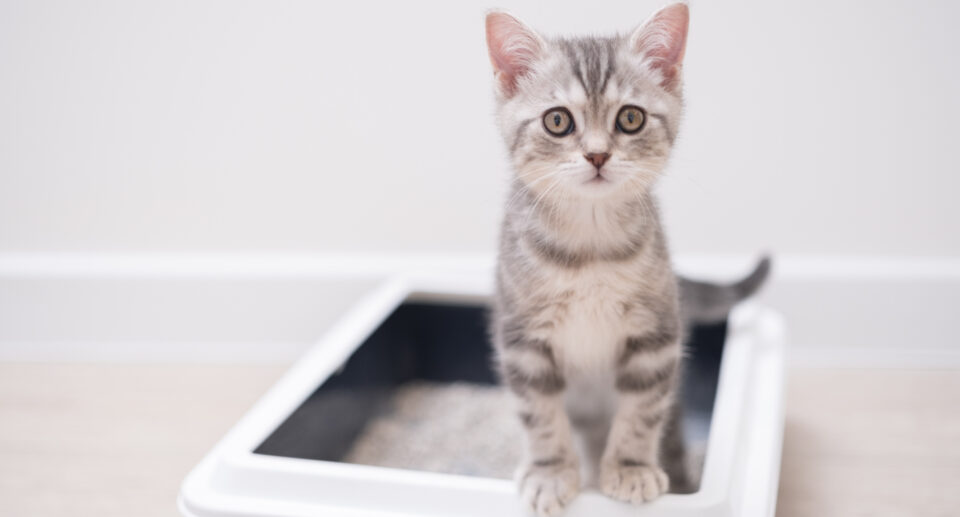
For a tiny single-celled organism, toxoplasma has caused decades of hysteria. Is it really dangerous for people to scoop litter while pregnant – or even own a cat? Does this parasite really turn normal, sane people into “crazy cat ladies”?
Spoiler alert: toxoplasmosis is no reason to be afraid of cats.
It’s still important to stop the spread of toxoplasmosis, but it’s just as important to stop the spread of fear-mongering when it comes to our faithful felines.
Read on to learn the facts, the risks, and the outdated myths about this perplexing parasite.
Toxoplasmosis: Should We Worry?
If you’re short on time, here’s the rundown on what you need to know about toxoplasmosis.
- Around 1 in 10 Americans have antibodies that indicate previous exposure to the parasite. Most infections are asymptomatic or cause mild flu-like symptoms.
- Rare, severe cases can cause seizures, vision loss, organ failure, and death in unborn children and severely immunocompromised individuals.
- People are more likely to contract the parasite from eating undercooked meat, contaminated water or unwashed vegetables than from handling cat litter.
- Around 1 in 3 cats have had toxoplasmosis. Outdoor cats that hunt, as well as those that eat a raw diet that has not been commercially processed are most likely to contract the parasite. Look for a freeze dried raw cat food that’s complete, balanced and treated with HPP to eliminate pathogens.
- Cats only shed the parasite in their feces for two weeks after initial exposure to the parasite.
- You cannot get toxoplasmosis from petting, kissing, cuddling, or other close contact with your cat.
What is Toxoplasmosis?
Toxoplasmosis is an infection caused by Toxoplasma gondii, a single-celled parasite that causes asymptomatic or mild illness in most hosts, but can cause life-threatening complications in unborn children and immunocompromised individuals.
How Do Cats Spread Toxoplasmosis?
Most warm-blooded animals, including humans, birds, livestock, and dogs, are intermediate hosts, meaning the parasite can infect – but cannot reproduce – within these hosts.
Cats, including domestic cats and wild cats like lions and tigers, are the only known definitive hosts of the toxoplasma gondii parasite. Cats contract the parasite from eating raw or undercooked meat, from exposure to an infected cat’s feces, or by hunting and consuming wild game like mice and birds.
The parasite reproduces by producing oocysts (eggs) within the digestive tract of a feline host, which are shed through its feces. An infected cat will shed oocysts in their feces for two weeks following initial exposure to the parasite.
How Does Toxoplasmosis Spread?
Oocysts from cat feces can contaminate water, soil, vegetables, or fruit, as well as forage like hay or grass and can survive for up to a year in the environment. Animals like cows, sheep, and birds ingest oocysts by consuming contaminated food or water.
Thankfully, a host with a healthy immune system is unlikely to experience symptoms of an infection. The infection becomes latent, and the parasite will form cysts in the muscle and brain tissue, called bradyzoites.
How Do Humans Get Toxoplasmosis?
As for humans, we most commonly contract toxoplasmosis by eating undercooked meat. According to the CDC, bradyzoite cysts in the muscle tissue of meat animals are destroyed when meat is cooked to at least 160° F.
People can also contract toxoplasmosis by consuming contaminated water or unwashed produce, as well as from not washing our hands after gardening in contaminated soil or after cleaning a recently infected cat’s litterbox. Children also commonly contract the parasite from playing in a sandbox.
Toxoplasmosis, Cat Litter and Pregnancy
Those who are or have been pregnant have likely heard that you should not clean your cat’s litterbox while pregnant.
This is because if you have not been previously infected by the parasite, a new infection can pose a serious health risk to your unborn child.
The risk is relatively low. Cats only shed toxoplasma oocysts for two weeks after their first exposure to the parasite. And pregnant people are only at risk if they have not been infected before. Keep in mind that most toxoplasmosis infections are asymptomatic, so you may not realize if you or your pet currently or have previously been exposed to the parasite.
You cannot contract toxoplasmosis from petting your cat,kissing your cat, or otherwise enjoying their company. So, there’s no need to rehome your cat if you become pregnant. The CDC recommends avoiding litterbox duty if possible. If you must clean the litterbox, wear gloves and always wash your hands after handling soiled litter.
Can Cats Get Toxoplasmosis from A Raw Diet?
Bradyzoite cysts, often found in the muscle meat of many otherwise healthy animals, can cause infection in people or animals that consume raw or undercooked meat. Cooking meat to at least 160° F eliminates the risk of toxoplasmosis.
Does your cat eat a raw diet? A fresh, raw diet for cats can offer many health benefits, but can also put your cat at risk for contracting toxoplasmosis. However, most cats will not experience symptoms of an infection. Oocysts are shed in the feces of newly infected cats for just two weeks.
However, cats with a compromised immune system, such as young kittens and those with chronic illnesses, can be at risk of symptoms of serious illness from toxoplasmosis.
You can feed a commercially prepared raw diet that has been through high pressure processing (HPP), which eliminates harmful pathogens.
Cats that are allowed to roam and hunt can contract toxoplasmosis from hunting and consuming wild mice and birds.
What Are The Symptoms of Toxoplasmosis?
While the majority of those infected with toxoplasmosis will never experience any noticeable symptoms, the parasite can cause serious illness in vulnerable individuals.
Some adults and children get flu-like symptoms like a fever and achy muscles upon initial infection of toxoplasmosis.
Immunocompromised people, including those with HIV/AIDS or those in cancer treatment may experience symptoms from a new infection or if a latent infection is reactivated.
Pregnant people may not experience symptoms, but can pass the infection to their unborn child. Pregnancy complications like low birth weight, premature birth, and miscarriage can occur. Babies born with toxoplasmosis may not experience symptoms, but can have complications like vision loss, or seizures months, sometimes years after birth.
In rare, severe cases, toxoplasmosis can cause serious health complications like seizures, muscle weakness, liver failure, and respiratory issues.
Does Toxoplasmosis Cause Mental Illness?
After initial infection with toxoplasmosis, bradyzoite cysts can remain in the muscle and brain tissue. These cysts are usually benign. However, there’s some evidence that cysts remaining from a latent infection could affect neurotransmitters that affect emotions, fear, and decision-making.
When the parasite infects rodents, it appears to change the way they react to the scent of cat urine. Interestingly enough, mice that have had toxoplasmosis no longer seem to fear cats. In fact, they can become attracted to the scent of cat litter, making them easy prey. Which totally makes sense – if an infected mouse is eaten by a cat, the parasite’s lifecycle will continue.
However, there’s no evidence that suggests the parasite causes the same change in humans.
A handful of small, outdated studies suggest that individuals diagnosed with schizophrenia were more likely to have toxoplasmosis antibodies, but it’s unclear how the infection could coincide with environmental and genetic risk factors.
A 2016 University of Chicago study explored personality changes that may be linked to latent toxoplasmosis infection. Those diagnosed with mental health conditions characterized by impulsiveness and aggression were more likely to have been exposed to the parasite – but a higher likelihood of risky behaviors like eating undercooked meat could not be ruled out.
More recent, more extensive research studies on the topic have not confirmed a link between mental illness, toxoplasmosis, and cat ownership. On the contrary, numerous studies have shown the mental health benefits of sharing your home with a cat. So, fear not, having cats will not make you a crazy cat person.
How To Prevent The Spread of Toxoplasmosis
Now you know that toxoplasmosis, while nothing to purr about, does not need to stop you from enjoying your cat.
Households with pregnant, very young, or immunocompromised individuals should take extra caution, and everyone should practice good hygiene to keep this parasite at bay.
- Wash your hands after handling cat feces or soiled litter.
- Wash your hands after gardening, as soil may be contaminated with cat feces.
- Keep sandboxes covered as stray and feral cats often defecate in playground sandboxes, and make sure children wash their hands after playing in sand.
- Cook meat thoroughly to at least 160° Fahrenheit.
- Wash and peel fruits and veggies before eating.
- Clean litterboxes often as toxoplasma oocysts in feces become infectious in as little as 24 hours. Scoop daily and completely clean litterboxes often. An automatic litterbox can be a great tool in preventing the spread of toxoplasmosis.
- Keep your cat indoors to reduce your cat’s risk of exposure from mice, birds, and feces of stray cats.
- Go raw the right way by avoiding raw cat food that has not been commercially prepared to eliminate pathogens. Instead, feed dry kibble, canned food, or try HPP processed raw cat food and freeze-dried raw cat food.Still have questions about toxoplasmosis? Want to learn more about safely feeding a fresh diet? Talk to a veterinarian today! Schedule your cat’s first virtual vet visit with VetLive.





